|
|
|
Sort Order |
|
|
|
Items / Page
|
|
|
|
|
|
|
| Srl | Item |
| 1 |
ID:
142038
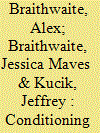

|
|
|
|
|
| Summary/Abstract |
Violent domestic conflicts spread between countries via spillover effects and the desire to emulate events abroad. Herein, we extend this emulation logic to the potential for the contagion of nonviolent conflicts. The spread of predominantly nonviolent pro-democracy mobilizations across the globe in the mid-to-late 1980s, the wave of protests in former Soviet states during the Color revolutions in the 2000s, and the eruption of nonviolent movements across the Middle East and North Africa during the Arab Spring in the early 2010s each suggest that the observation of collective action abroad encourages a desire to emulate among potential challengers to domestic autocrats. However, the need to emulate varies. Potential challengers with a recent history of protest at home are less dependent (than are those without similar experience) upon foreign exemplars to mobilize the participants and generate the resources required to make emulation practicable. By contrast, where the domestic experience of protest is absent, opposition movements are more reliant upon emulation of foreign exemplars. We test the implications of this logic using a series of multivariate logistic regression analyses. Our tests employ data on nonviolent civil resistance mobilizations that occurred across the global population of autocratic states between 1946 and 2006. These tests, along with post-estimation analysis, provide evidence consistent with our conditional logic of emulation.
|
|
|
|
|
|
|
|
|
|
|
|
|
|
|
|
| 2 |
ID:
134516
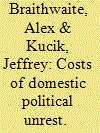

|
|
|
|
|
| Summary/Abstract |
Does domestic political unrest deter foreign direct investment (FDI)? And what are the longer term impacts of unrest upon the market? Most theories suggest that investors are deterred by unrest. However, empirical research returns only marginal support. We argue that these mixed results stem from the conflation of the distinct tactics and outcomes of political unrest. Violent forms of unrest increase uncertainty and risk. By comparison, nonviolent forms of unrest are shown to more frequently achieve their goals and increase the prospects for democratic change and market stability. In addition, investors avoid markets where campaigns have ended in failure, defined as the campaign not achieving their stated political aims. Failed campaigns often precipitate a cycle of unrest that create greater uncertainty over the long-term stability of a state. We find strong evidence in favor of our propositions, even after taking political motivation and non-random selection into account.
|
|
|
|
|
|
|
|
|
|
|
|
|
|
|
|
| 3 |
ID:
149520
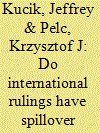

|
|
|
|
|
| Summary/Abstract |
How influential are international courts? Can their rulings reach beyond a given case and affect the behavior of countries not party to the dispute? International law is clear on the matter: rulings have no formal authority beyond the case at hand. This tenet is consistent with the incentives of sovereign states wary of delegating too much authority to courts. By contrast, the authors claim that even in the absence of formal authority, the rulings of international courts can affect behavior by mobilizing pro-compliance groups in countries not party to a dispute. They test these beliefs in the context of the World Trade Organization (WTO) through a novel approach. Because WTO rulings have implications for the fortunes of publicly traded firms, they examine whether financial markets bet on there being spillover effects beyond the case at hand. They rely on two quantitative case studies to test for a cross-border and a cross-industry spillover effect: can rulings have effects in countries and on industries other than those at issue in the initial dispute? The results suggest that the answer is a tentative yes. The spillover effects of international rulings may be a matter of scholarly contention, but their existence is something that financial markets appear willing to bet on.
|
|
|
|
|
|
|
|
|
|
|
|
|
|
|
|
| 4 |
ID:
146200
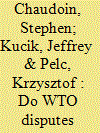

|
|
|
|
|
| Summary/Abstract |
Exporters, trade lawyers, policy makers, and academics see the WTO's Dispute Settlement Understanding as an important, though costly, venue for facilitating the removal of harmful barriers to trade. If this conventional wisdom holds, then disputes should increase trade. We provide a careful analysis of trade flows in the wake of WTO disputes. We find that WTO disputes do not increase the respondent country's imports of the products at issue. Instead, our analysis shows very narrow effects from disputes. These depend on the dispute outcome and issue area. Although we find variation across countries in their responsiveness to disputes, no single explanation accounts for this variation. Our evidence casts doubt on arguments that dispute settlement promotes trade between members.
|
|
|
|
|
|
|
|
|
|
|
|
|
|
|
|
| 5 |
ID:
083127


|
|
|
|
|
| Publication |
2008.
|
| Summary/Abstract |
Do flexibility provisions in international agreements-clauses allowing for legal suspension of concessions without abrogating the treaty-promote cooperation? Recent work emphasizes that provisions for relaxing treaty commitments can ironically make states more likely to form agreements and make deeper concessions when doing so. This argument has particularly been applied to the global trade regime, the General Agreement on Tariffs and Trade (GATT) and its successor, the World Trade Organization (WTO). Yet the field has not produced much evidence bearing on this claim. Our article applies this claim to the global trade regime and its chief flexibility provision, antidumping. In contrast to prior work, this article explicitly models the endogeneity and selection processes envisioned by the theory. We find that states joining the WTO are more likely to adopt domestic antidumping mechanisms. Likewise, corrected for endogeneity, states able to take advantage of the regime's principal flexibility provision, by having a domestic antidumping mechanism in place, are significantly more likely to (1) join the WTO, (2) agree to more tightly binding tariff commitments, and (3) implement lower applied tariffs as well.
|
|
|
|
|
|
|
|
|
|
|
|
|
|
|
|
| 6 |
ID:
162772
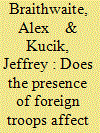

|
|
|
|
|
| Summary/Abstract |
Troops were deployed on an unprecedented scale during the Cold War. Much of the network of deployments established during that time has persisted long after the end of the Cold War. We look to contribute to a growing literature addressing the costs and benefits associated with hosting foreign troops. We ask: Does the presence of foreign troops affect stability in the host country? To answer this question, we develop an argument in which deployed troops are seen as a costly signal of the deploying state’s interest in and commitment to stability in the host country. The presence of foreign troops positively affects the perceived stability of the host country and the robustness of their legal and political institutions. This bolsters the enforcement of agreements between the host government and latent and manifest opposition groups to pursue alternatives to fighting. We test this logic using instrumental variables regressions in which we endogenize deployment motivations. All tests support the expectation that the presence of foreign troops reduces the likelihood of the occurrence of civil conflict in the host state.
|
| Contents |
Troops were deployed on an unprecedented scale during the Cold War. Much of the network of deployments established during that time has persisted long after the end of the Cold War. We look to contribute to a growing literature addressing the costs and benefits associated with hosting foreign troops. We ask: Does the presence of foreign troops affect stability in the host country? To answer this question, we develop an argument in which deployed troops are seen as a costly signal of the deploying state’s interest in and commitment to stability in the host country. The presence of foreign troops positively affects the perceived stability of the host country and the robustness of their legal and political institutions. This bolsters the enforcement of agreements between the host government and latent and manifest opposition groups to pursue alternatives to fighting. We test this logic using instrumental variables regressions in which we endogenize deployment motivations. All tests support the expectation that the presence of foreign troops reduces the likelihood of the occurrence of civil conflict in the host state.
|
|
|
|
|
|
|
|
|
|
|
|
|
|
|
|
| 7 |
ID:
170029


|
|
|
|
|
| Summary/Abstract |
International dispute systems are often designed so that dispute body rulings do not set precedent. Yet governments have incentives to learn from prior decisions. Past rulings convey important information about how the law is applied. This is especially true in the World Trade Organization (WTO), where disputes frequently occur between the same members and over the same issues. I argue that case law increases the likelihood of early settlement. This helps explain why fifty percent of WTO cases end prior to a formal ruling. I use new data on the direction of ruling on each legal claim made in the first 450 WTO disputes. The results show that litigants are significantly more likely to settle early given the presence of previous legal decisions.
|
|
|
|
|
|
|
|
|
|
|
|
|
|
|
|
| 8 |
ID:
099105


|
|
|
|
|
| Publication |
2010.
|
| Summary/Abstract |
Why do some countries protect minority shareholders from rent-seeking by corporate insiders while others do not? To the extent that there has been convergence toward shareholder-friendly laws, what factors have shaped that convergence? We explore this question by examining the worldwide diffusion of insider trading laws through a series of event history analyses. We argue that variation in the adoption and enforcement in insider trading laws can be best explained by the interaction of rising international competitive pressures to attract investment capital through investor-friendly laws and electoral laws that make governments more or less vulnerable to economic voting. We find that governments are more likely to adopt and enforce insider trading laws when they face reelection under electoral laws that make them relatively vulnerable to economic voting and when they face international competitive pressures. Moreover, we find that the impact of domestic political institutions declines in significance as international competitive pressures increase, and vice-versa.
|
|
|
|
|
|
|
|
|
|
|
|
|
|
|
|
|
|
|
|
|